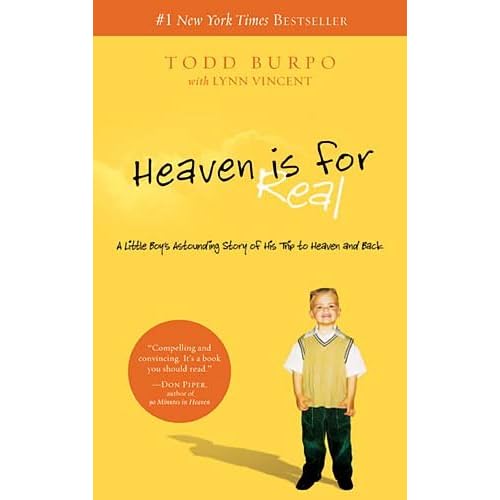A while back (quite a while) I had come across a blog post here regarding the book “Heaven is Real: A Little Boy’s Astounding Story of His Trip to Heaven and Back.”

It’s the story of Colton Burpo, the four-year-old child of the pastor of Crossroads Wesleyan Church in Imperial, Nebraska (looks like they’ve only recently installed their WordPress site and not updated it), who during emergency surgery is said to have gone to Heaven to sit in Jesus’ lap and have angels sing to him until he was resuscitated. The book tells of the claims and observations made by the child while he was dead/unconscious that seem to defy logic and support the idea that the Biblical god is for real. So far I’m only 11 pages into it but here are my observations so far:
Colton, like me, was brought up in the church by a pastor and presumably indoctrinated from birth with ideas of Heaven and Hell, Jesus and Satan, angels and demons, and all of the cute little songs that kids learn in Sunday School. Whatever he did or didn’t see during the time when he was dead/unconscious would have been influenced heavily by this because it’s a cornerstone of his upbringing and the foundation of his family’s faith. He doesn’t have to think about Jesus or angels, it’s just part of his immature belief system.
The author (the father, Todd) states in his introduction, “Now, as a pastor, I’m not a believer in superstition.” I completely acknowledge that in this context he’s talking about superstition relating to “chills” or “bad feelings” about a road trip, etc. – the kind of superstition that drives baseball players not to change their socks or whatever. However, Todd most definitely believes in superstition. He believes that the ritual of praying will affect the outcome of an event. He believes that going to church on a regular basis will affect the strength of his faith. He believes that reading the Bible on a regular basis will affect his relationship with god. These are all ritualistic, superstitious practices. If Todd began wearing the same pair of socks whenever he preached because he thought it made his sermon better, it really wouldn’t be a stretch above and beyond what he already believes. The only difference would be that it’s not prescribed by the Bible.
Colton says that while he was in Heaven sitting in Jesus’ lap the angels were singing songs to him like “Jesus Loves Me” and “Joshua Fought the Battle of Jericho.” That’s a nice thought, but doesn’t it seem a little silly and maybe too convenient that the angels would just happen to be singing the Sunday School songs Colton knows? I know this seems like a weak objection and I’ll readily admit that, but think about it: angels are ethereal creatures who live on a completely different plane of existence. They would presumably have the capability of singing songs to this child (not even the child, but the child’s soul) that would comfort him. Perhaps “Jesus Loves Me” qualifies as such, but “Joshua Fought the Battle of Jericho?” Really? That just seems ridiculous to me…and by that, I mean it’s merely my personal opinion that nobody else has to adopt.
Obviously, I’m skeptical to the claims this book has made and will be making. It’s no secret I don’t believe in Heaven or god. However, I intend to continue reading this book with as open a mind as I can muster and give it due consideration. I’m really curious to see why there’s all the buzz over it, but I have a sneaking suspicion that it all stems from the fact that people who already believe in this find that it provides the sort of evidence that they not only accept but latch onto in order to bolster their beliefs. I doubt this story would do much to convince someone who didn’t already believe before they started reading the book but like I said, I’m only 11 pages into it.
I’ll keep you posted.











